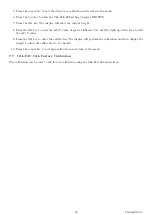
8
Automatic Weight Output
8.1
Introduction
The automatic output is normally used to drive remote displays, dedicated computer connections or PLCs.
The output generates a simple weight message at predefined intervals.
8.2
Formats
There are 6 automatic output formats, including one custom format. The start and end characters of the
format strings can be set (even for the standard formats) in the
SERIAL:AUT.OPT
menu.
Basic format:
Start Format End1 End2
where:
Start: Start character (set in
SERIAL:AUT.OPT:ST.CHR
)
Format: Format string (set in
SERIAL:AUT.OPT:TYPE
)
End1: 1st termination character (set in
SERIAL:AUT.OPT:END.CH1
)
End2: 2nd termination character (set in
SERIAL:AUT.OPT:END.CH2
)
8.2.1
Format A
Format:
Sign Weight Status
where:
Sign (1 character): SPACE or ‘-’
Weight (7 characters): The weight in 7 characters with decimal point and leading spaces.
Status (1 character) = ‘G’, ‘N’, ‘U’, ‘O’, ‘M’ or ‘E’ for Gross, Net, Underload, Overload, Motion and
Error.
8.2.2
Format B
Format:
Status Sign Weight Units
where:
Status (1 character) = ‘G’, ‘N’, ‘U’, ‘O’, ‘M’ or ‘E’ for Gross, Net, Underload, Overload, Motion and
Error.
Sign (1 character): SPACE or ‘-’
Weight (7 characters): The weight in 7 characters with decimal point and leading spaces.
Units (3 characters): Weight units with leading spaces, e.g. ‘ kg’ or ‘ t’. When the weight is unstable ‘ ’
is sent.
8.2.3
Format C
Format:
Sign Weight S1 S2 S3 S4 Units
47
C500-600-2.0.3
Summary of Contents for C500 series
Page 1: ...C500 Series Digital Indicator Reference Manual ...
Page 54: ...8 3 Custom Format Tokens 8 3 1 Formatting 49 C500 600 2 0 3 ...
Page 56: ...230 Send time in format hh mm ss 231 Send Date in format dd mm yyyy 51 C500 600 2 0 3 ...
Page 123: ...118 C500 600 2 0 3 ...
Page 182: ...177 C500 600 2 0 3 ...
















































